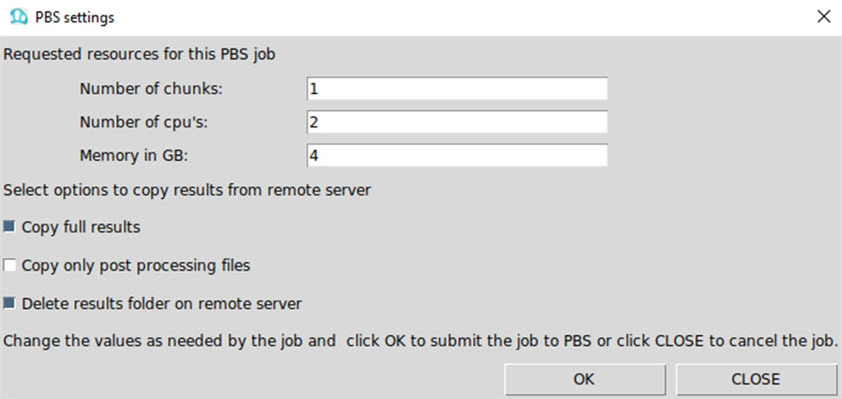Remote Server User Guide
- Identify all input and data files needed to run this job, move them from the client host to a location accessible from the remote server, and adjust these files to reflect new location.
- Trigger job to run on the remote server.
- Collect the files needed by the user and bring them back to the client host.
- Clean up the disks on remote server after the run.
Different File Locations
Running the job may require additional moving of the files before and after the run, and even some additional file transfers between the stages of the solver.
- Run directory:
Location where all input files are finally used to run the solver. In case of MPI run, this may represent multiple locations (one local disk attached to each host), although for AcuSolve, the run directory should be shared between all MPI processes.
- Stage directory:
Location which is accessible from outside of cluster and from hosts inside the cluster. This is just a temporary ‘parking’ area for the files before they end up at the location suitable for the run. The stage directory may not be suitable for running the solver – this is typical when stage is set on slower disk, or when it is used by many hosts. In both cases it is recommended to have a separate run directory location to speed up the execution.
- Specifying only the run directory is appropriate for local runs (for MPI execution), but for remote execution, it should only be used together with stage directory.
RundirStagedirCopyoptionsPushfileFilelist
Input Files
- For Altair Manufacturing Solver, the main input file contains the list of all relevant input files, and so ACC reads it from there.
- OptiStruct
provides an option to run in a special test mode (internal option
-inventory) to provide such list. - In some cases when ACC can figure out
the list of required files, but it happens to be incomplete, you must expand
this list manually using option
-pushfile.
- Modify input files and adjusts these references – this creates potentially confusion for you, as reports from the run contain references to the files at unexpected locations. This is troublesome for error messages.
- Direct the solver to accept that the
files have been relocated. Only some solvers allow that: OptiStruct has various internal command line options
to specify search path for includes (
-incpath) or explicitly force to use all files from the single location (-asp,-localonly). For other solvers, it is expected that all additional files needed for the remote run are located in the same directory as the main input file.
In rare cases (very complex structure of includes for OptiStruct run), the set of input files may contain files with identical names but different locations. Currently, ACC cannot handle such runs for remote submission.
Output Files
- Copy everything
- Copy only known output files (H3D files)
- Do not copy anything
- (Optional) Completely remove all traces of the run from remote server

When the run directory is specified, ACC will automatically move all files between stage and run locations before and after the run, and ensure that the run location will be clean after the run.
Control Remote Job
- Memory requirements
- Number of cores, hosts or
pbschunks(for MPI runs) - Specific hosts or the queue name to submit.
These items may also be requested on the command line through following options.
Once the remote job is submitted, ACC allows to interactively check the status of
such job. On the ACC GUI, there is menu option (), and the command line option (-jobstatus). When the
check confirms that the job completed on a remote server, ACC automatically starts
the download of selected output files and cleans stage location as requested during
submission. All subsequent inquires for this jobid will be void,
and any further copying or cleaning (if desired) needs to be done manually by direct
connecting to the remote server.
pbschunkspbscpupbsmempbsqueuejobstatus
Submit Output Files
After a job is completed, ACC will collect all useful artifacts of the run and copy them to a separate location in a stage directory. Run directory (directories) if present and different from stage directory, will be cleaned.
- Copy full results:
All files created by the run will be copied to a client location (on the laptop), and erased from the stage location.
- Copy only the post-processing files:
Only the files of known type will be copied to the client location.
- Delete results on remote server:
When this option is selected, all files on the stage location will be deleted after the run. Otherwise, they will remain, and it is your responsibility to remove them when no longer needed.
Once the operations selected above are performed, ACC will move the job information to the History form, where it can be used for reference only. All files which are left on the client host or on the server are no longer controlled by ACC. It is your responsibility to remove them when no longer needed.